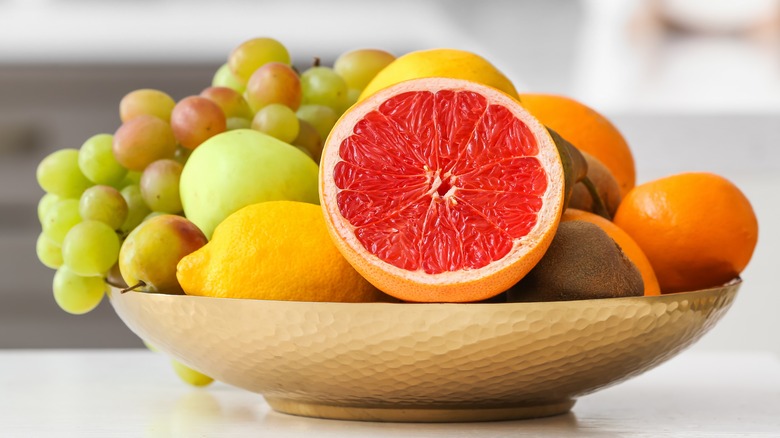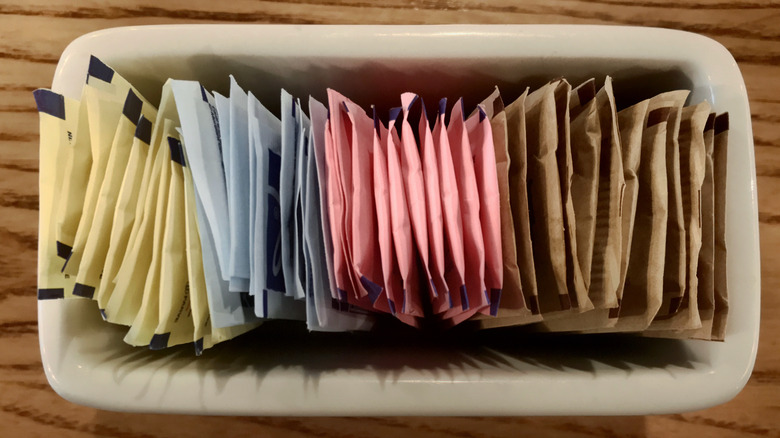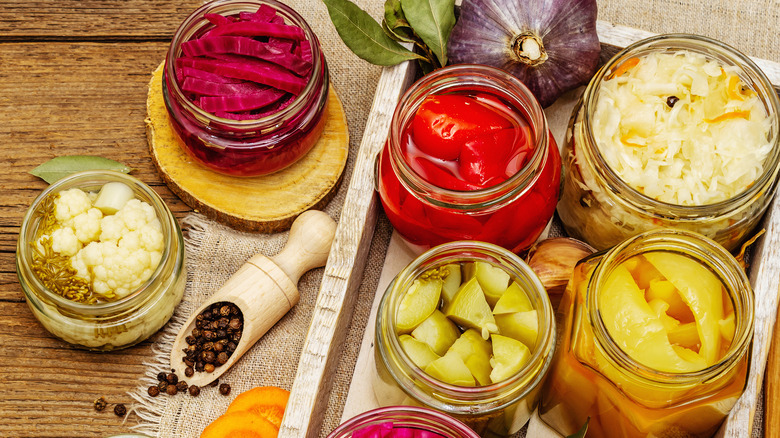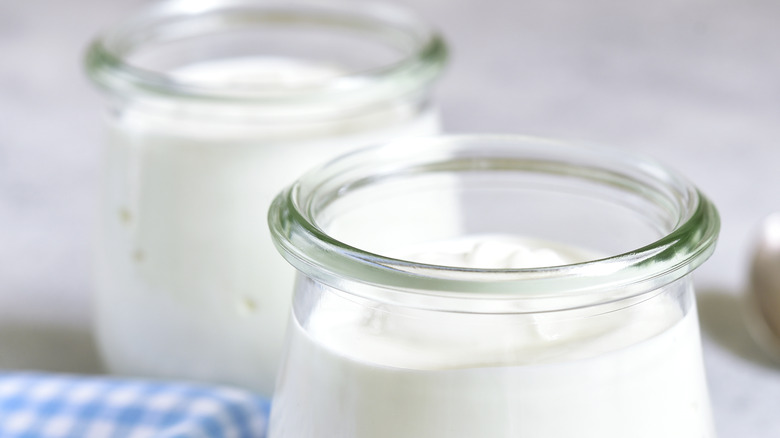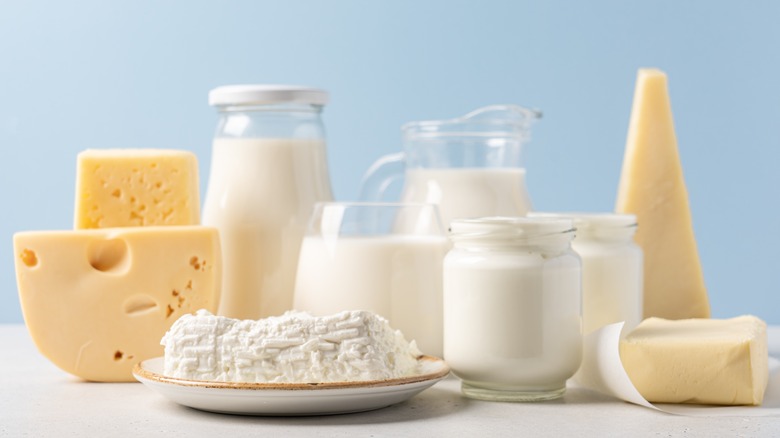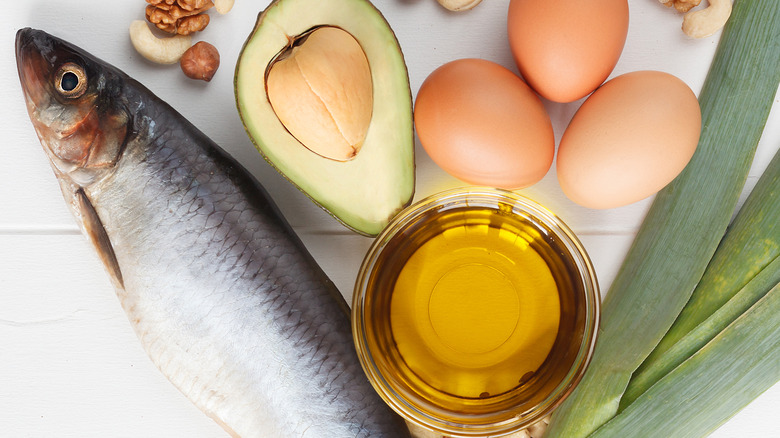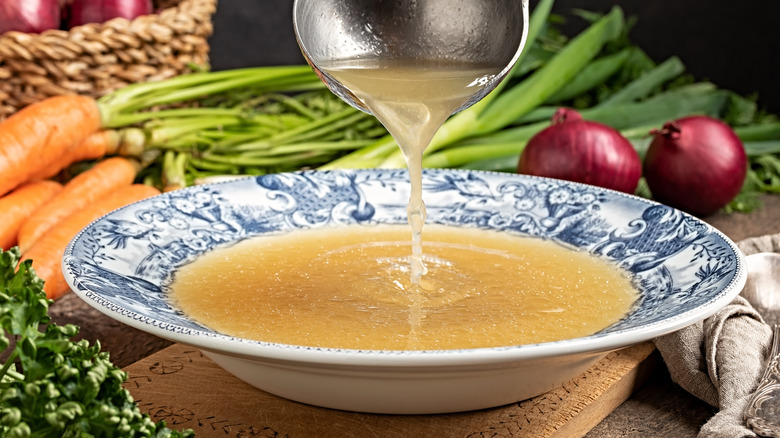6 Foods To Eat And 6 To Avoid If You Have A Leaky Gut
You may experience bloating, gas, cramps, and fatigue from time to time (or more often than you'd like to admit). These issues could be related to stress, food sensitivity, hormonal issues, GERD – you name it. Or they may result from a condition called leaky gut (via a 2019 review in Gut). But what exactly does this mean?
The term "leaky gut" refers to increased intestinal permeability, allowing larger amounts of undigested food particles, bacteria, and toxins to pass from your intestines into the bloodstream (via Healthline). There is some permeability in normal gut function, as the intestinal lining has small gaps to allow for nutrients and water to flow into the bloodstream. But this normally tight junction keeps problematic larger particles from passing through the barrier. When compromised, digestive distress may result. And as some propose, it might even lead to a host of inflammatory diseases, a condition naturopaths deem as "leaky gut syndrome."
But, while there is plenty of scientific evidence regarding gut barrier dysfunctional in diseases such as Chron's disease or IBS, the medical community does not support "leaky gut" as a true medical condition, according to the 2019 review. Furthermore, intestinal permeability is not visibly accessible. Current standards measure the permeability of the intestinal barrier via saccharide injection to evaluate particles released in the urine. Nonetheless, gut barrier function is essential to good health — and nutrients, prebiotics, and plant extracts may improve the integrity of the gut and its lining.
Is there a relationship between a leaky gut and chronic disease?
Increased intestinal permeability (aka "leaky gut") is an issue in those with Irritable Bowel Syndrome (IBS), via Harvard Health Publishing. There are also some studies on leaky gut and its potential link to chronic diseases such as multiple sclerosis, lupus, and type 1 diabetes. However, further research and clinical human evaluation are necessary.
So, let's talk about the relationship between a "leaky gut" and IBS. Research shows that a compromised intestinal barrier is implicated in the progression of IBS. According to a 2012 study in Digestion, significant increase in gut permeability was localized in the colon for patients with diarrhea-predominant IBS and inactive ulcerative colitis. A 2021 review in Therapeutic Advances in Gastroenterology showed a positive association between reduced gut barrier function and IBS symptoms such as abdominal pain and bowel dysfunction. In the systematic review covering 66 studies, greater permeability was found in both the small and large intestines in diverse sets of individuals with IBS. Thus, a diagnosis of IBS may be a sign your gut barrier function is compromised (via Shoenwalder Health & Wellness).
That said, you can protect your gut and overall intestinal health by eating foods that promote the growth of beneficial gut bacteria (via Healthline). Include a wide variety of color-rich fruits and vegetables, fermented or cultured vegetables and dairy, lean proteins, and healthy fats. Avoid foods that promote inflammation (i.e., excess sugars and highly processed foods) to decrease the proliferation of harmful bacteria.
Eat: Fruits
To support your gut health, you can reach for a wide variety of delicious, naturally sweetened fruit. That's because fruits contain antioxidants, essential nutrients, and fiber to support gut-health (via Healthpath). Apples have an array of antioxidants and nutrients that reduce inflammation and keep your gut colony thriving (via Harvard Health Publishing). Stone fruits such as peaches, plums, and apricots also support your gut with their anti-inflammatory qualities.
And let's not forget citrus fruits, known for their levels of vitamin C. Vitamin C supports the epithelial barrier of your skin, warding off damaging toxins (via a 2017 review in Nutrients). But did you know that vitamin C may also be protective for the lining of your gut? Various animal studies have linked Vitamin C deficiency to an impaired gut barrier, according to a 2019 review in Redox Biology. In human studies, gut barrier dysfunction has been detected in those with scurvy, the researchers say. Furthermore, vitamin C intake may also lead to beneficial shifts of gut microbiota in humans, according to a 2021 study in Antioxidants. While this pilot study is limited research, it provides promise for future studies.
Avoid: Refined sugars and artificial sweeteners
Did you know that sugar can weaken the structure of your gut's protective lining? That's because your gut colony may influence the permeability of your gut's lining, according to a 2021 review in Gut Pathology. Both the healthy bacterial colony and the gut's physical lining act as barriers against damaging pathogens and foods can impact the diversity of your gut microbiome (for better or for worse).
Excesses in refined sugars can suppress the growth of healthy gut bacteria, while allowing the unhealthy bacteria to proliferate (via Dr. Suhirdan Vivekanadarajah). This may compromise gut barrier protection. What's more, it may also lead to weight gain, metabolic disease, and diabetes, according to a 2022 study by the Columbia University Irving Medical Center (via ScienceDaily).
Artificial sweeteners may be just as damaging. According to a 2021 review in the International Journal of Molecular Sciences, food additives that have been designed to improve taste, appearances, and longevity in food and drink (including zero-calorie sweeteners) also impact the composition of your gut. While these may help obese individuals and those with diabetes to lose weight, they may also have a backfiring effect. In both animal and human studies, artificial sweeteners have been shown to promote metabolic disease by contributing to dysbiosis of the gut. Recent studies have shown that artificial sweeteners may also damage epithelial cells of the gut lining and increase its permeability, hence contributing to a leaky gut.
Eat: Fibrous and fermented vegetables
Fuel your digestive health with the fiber-rich veggies! Fiber helps nourish the gut, allowing the good bacteria to thrive (via Biohm Health). You should strive to get 14 grams of fiber per 1000 calories (or between 25 and 38 grams per day), via Academy of Nutrition and Dietetics.
Cruciferous veggies (such as broccoli, Brussels sprouts, cabbage, and kale), chard, and spinach are great options (via Healthline). Root veggies such as carrots, sweet potato and squash are good, too! High in both soluble and insoluble fiber, these veggies contain varying amounts of prebiotic fibers to feed the good bacteria. In fact, all plants contain small amounts of prebiotics, although some are much higher in this nutrient than others (via Trifecta). Some richer sources of prebiotics include Jerusalem artichoke, onions, and garlic.
Fermented veggies such as kimchi, miso, sauerkraut, and tempeh help by providing a probiotic benefit (via BBC Good Food). Probiotics help the gut by restoring a healthy balance of bacteria in the gut. They help support digestion and may resolve/prevent digestive distress.
Avoid: Highly processed foods
Low in fiber and often high in fats and sugars, highly processed foods are a nutrition-devoid composition that negatively impacts our health, according to a 2017 review in Foods. And they may even impact the prevalence of autoimmune disorders such as celiac disease and type 1 diabetes, according to some research. The rationale: These ultra-processed foods disrupt the balance of gut bacteria and promote inflammation — factors that may lead to greater intestinal permeability or a "leaky gut," and potentially increased risk for autoimmune disorders. Quite the opposite can be said for minimally processed, whole food/plant rich diets, which offer a beneficial support to the gut, as well as impact our overall immunity.
What you eat can influence your immunity. Here's why: The intestines have a large surface area, allowing greater exposure to potential pathogens. Thus, the intestines contain the largest concentration of immune cells in the body, according to a 2019 review in Nutrients. But there is a fine balance of complex activity and response that the gut undergoes for maintaining a healthy immunity homeostasis — and disruptions of the microbiome can upset this balance.
Eat: Cultured dairy
According to a 2020 review in Gut Microbes, eating cultured dairy foods was shown favorable for a healthy gut composition. In four randomly controlled human trials studying the effects of fermented dairy products yogurt and kefir on the gut microbiota, the intake of cultured dairy products promoted the growth of Lactobacillus and Bifidobacterium (two probiotic strains), eliciting a beneficial change in the modulation of gut bacteria. Furthermore, fermented milk products such as yogurt and kefir may increase the production of gut-healthy butyrate, according to a 2014 study in Nature. In the study, IBS patients who consumed a fermented milk product altered their gut composition with increases in butyrate and decreases in pathogenic bacteria, ultimately reducing their IBS symptoms.
What's more, a certain protein found in dairy may reduce signs of aging in your gut. The casein in dairy is comprised of many branched chain amino acids (BCAAs), via Bustle. Apparently, there seems to be a link between BCAA's in the gut and the vitality (or "youthfulness") of its microbiome.
Avoid: Excess dairy
The question on whether dairy is healthful or harmful remains controversial, according to a 2020 review in Frontiers in Nutrition. Yes, dairy has beneficial macronutrients (including protein, vitamin D, and calcium), but its saturated fat and trans fat content has led to cause for concern.
And when it comes to your gut health, there are pros and cons as well. Milk contains gut-healthy casein, according to a 2019 review in Frontiers in Microbiology. And yet, the Mediterranean diet — emphasizing olive oil, a wide variety of plant foods, some moderate fish and poultry, and a low intake of dairy and meat — has been considered one of the most healthful diets, not only for your heart but also your gut (via Bustle). Thus, the answer may lie not in whether you consume dairy, but rather how much of it you consume (via Bustle). Hence, the need for moderation.
Eat: Healthy fats
Avocado and salmon are two sources of healthy fats that you should keep in your diet for a healthy gut (via Healthline). Avocados are a rich source of fiber and monounsaturated fats, both of which contribute to a healthy microbial diversity (via the American Society for Nutrition). Meanwhile, salmon is a rich source of polyunsaturated omega-3s, which also support a flourishing gut microbiome (via a 2017 review in Scientific Reports).
Extra virgin olive oil (EVOO) is also an optimal choice, as it is higher in antioxidants due to a more minimal processing. That's because it is freshly pressed without heat or chemicals (via Medical News Today). Like avocado, EVOO is a rich source of monounsaturated fats. Additionally, it is rich in polyphenols that are cardio-protective, anti-inflammatory, and — you guessed it — good for our gut, according to a 2017 review in Nutrition Reviews. Both animal and human studies have shown that EVOO consumption effectively reduces harmful pathogens, stimulates the proliferation of healthy gut bacteria, and increases the production of short chain fatty acids (SCFAs) in the colon, which protect your gut's integrity.
And don't forget to include a variety of nuts and seeds, including flax and chia, as they provide gut-healthy benefits, too (via Healthline).
Avoid: Highly refined oils
Certain oils contribute to inflammation, making them a poor choice for gut health (via Healthpath). These include refined oils such as sunflower oil and soybean oil. What makes them inflammatory is that these oils have a very high omega 6 content (via Ecowatch).
Over the past few decades, the ratio of omega 6s to omega 3s in the diet has gone up to approximately 15:1, according to a 2017 review in the Journal of Nutrition and Metabolism. This wide imbalance increases chronic inflammatory diseases, heart disease, and obesity. While both omega 3s and omega 6s are essential (as our bodies cannot produce them), high amounts of omega 6s are considered harmful (via Healthline).
What further makes these oils a poor choice is that the process of refining removes some beneficial nutrients including polyphenol antioxidants and cholesterol-controlling phytoesterols, while generating undesirable compounds such as harmful trans fats (per a 2022 review in Scientific World Journal).
Eat: Lean animal proteins
Protein is valuable to your digestive health. It supplies amino acids to support your tissues, organs, and a wide variety of body functions including digestion, energy production, and muscle contraction (via Healthline). You can include lean animal proteins (such as lean cuts of chicken, beef, lamb, and turkey) in your diet to support your digestive health (via Healthline). You may also enjoy eggs, as they are nutrient-dense and a rich source of vitamin A. Vitamin A not only protects your skin, but also the linings of your organs, including your intestinal tract (via Cleveland Clinic).
And you might be surprised to hear that red meat may not be as damaging as you may think — provided you exercise portion control and health quality (i.e., watch out for highly marbled or sections thick with fat as well as highly-processed options). Some research points out that cardiovascular risk factors aren't necessarily increased with the inclusion of lean red meats in one's diet. In fact, incorporating unprocessed, lean red meat in a Mediterranean-style diet may help overweight adults improve their cardiovascular health, lose weight, and lower their total cholesterol and LDL (bad) cholesterol levels, according to a 2018 study in the American Journal of Clinical Nutrition.
Avoid: Processed meats
The World Cancer Fund abides by complete avoidance of processed meat products, and other nutritional societies have set limits, according to a 2019 study in Nutrients.
Processed meats include whole pieces and mixtures of different types (often beef and pork), along with various animal parts. Further processing varies widely, and constitutes any range of salting, curing, or smoking for improved flavor, color, and shelf life. Unfortunately, plenty of epidemiological studies show a positive association between processed meat intake and chronic health risks, including coronary heart disease and cancer.
The nitrates found in processed meats may be cancer-forming (via BBC Future). Yes, there are also nitrates in healthy plant foods such as beetroot and spinach. But the way nitrates are contained within processed meats verses vegetables can make a difference in whether or not they can cause harm in the body. The amines in processed meats such as bacon and hot dogs react with their nitrates; and when heated at high temperatures they form nitrosamines, some of which may heighten a person's risk for colon cancer.
Drink: Bone broth
Bone broth (as with all broths and stocks) is both hydrating and comforting — and it also happens to be nourishing to the gut (via Healthline).
It is one of a few select beverages, including kombucha (a fermented tea) and hot tea, that may support overall gut health besides plain water. And some studies report that including bone broth in diet low in gluten, dairy, and sugars may be especially healing for a leaky gut, according to a 2020 review in the International Journal of Molecular Sciences.
While research is still limited, bone broths do contain nutrients from actual bone (including calcium and magnesium) that are essential to our diets. And interestingly enough, there's promise that calcium may help benefit the gut in the way that prebiotics do, modulating gut bacteria for a healthier balance, according to a 2016 study in Molecular Nutrition Food Resources. Magnesium supports muscle contraction, which means it is helpful in preventing constipation (via the Mindd Foundation). And while there's no definitive verdict on bone broth as a bona fide healer in the gut or beyond, there's been a long-standing tradition ofconsuming broth for its soothing properties when one has a cold (via Valley Children's Healthcare).
Avoid: Alcohol and soda
If you've ever had acid reflux, you may already know that alcohol can exacerbate acid indigestion (via UNC Health Talk). By loosening the lower esophageal sphincter, it allows acids from the stomach to reflux up the esophagus causing gastrointestinal distress (e.g., heartburn). Additionally, alcohol disrupts the normal balance of your gut colony — allowing more inflammatory-causing bacteria to thrive, while reducing the gut bacteria beneficial for our digestion — which is a perfect storm for a leaky gut, according to gastroenterologist Dr. Tanvir Haque.
Traditional soda, which is high in sugars, is bad for your waistline, promotes tooth enamel erosion, and depletes calcium, thereby weakening the bones. It is also a common trigger for acid reflux (via Beaumont Health). And with 40 grams of sugars on average per 12-ounce can (that's 10 teaspoonfuls), it is a source of excess sugar that is far too easy to consume. With that said, steer clear of the diet sodas, too. They contain those artificial sugars that can also wreak havoc on your metabolism, according a 2021 review in the International Journal of Molecular Sciences.
Lifestyle interventions for gut health
Eating foods that support a healthy gut, while being mindful of those that disrupt its healthy bacterial diversity, is essential to good health (via Healthline). But that's just one part of the puzzle. Lifestyle factors are just as important for reducing inflammation and keeping your gut in good shape.
Cumulative effects of a poor diet and chronic stress are common factors that influence inflammatory issues in the body (via the Cleveland Clinic). And heightened stress can contribute to inflammation in the gut, a precursor to leaky gut. Other lifestyle factors include sleep and exercise (via Medical News Today). Lack of sleep disrupts normal circadian rhythms and increases psychological stress, both of which affect our gut health. However, working out regularly may actually improve sleep by improving mood and decompressing the mind (via Johns Hopkins Medicine).
In addition to managing weight and improving heart health, exercise may also improve gut health. According to a 2014 study in Gut, athletes were found to have a greater microbial diversity in their gut than non-athletes, a sign of a healthier gut colony. Furthermore, exercise benefits digestion by increasing the blood flow to the digestive muscles for effectively moving food along the digestive tract (i.e., peristalsis), via AXA Health. This improves our ability to digest and absorb the nutrients we need.



